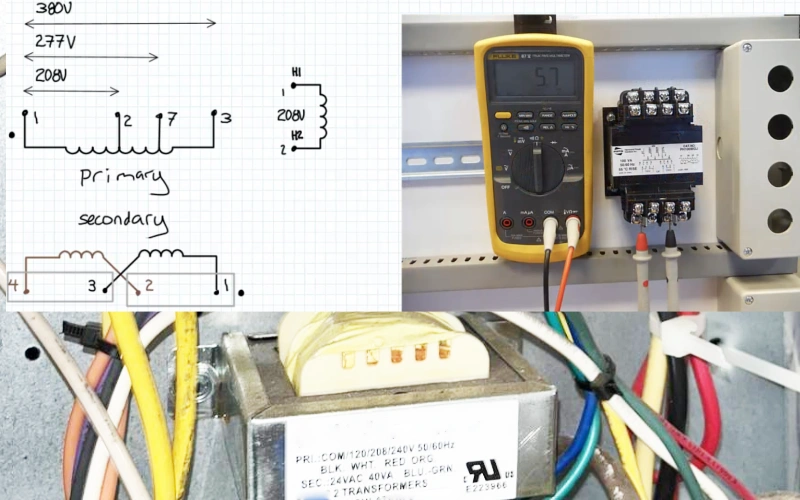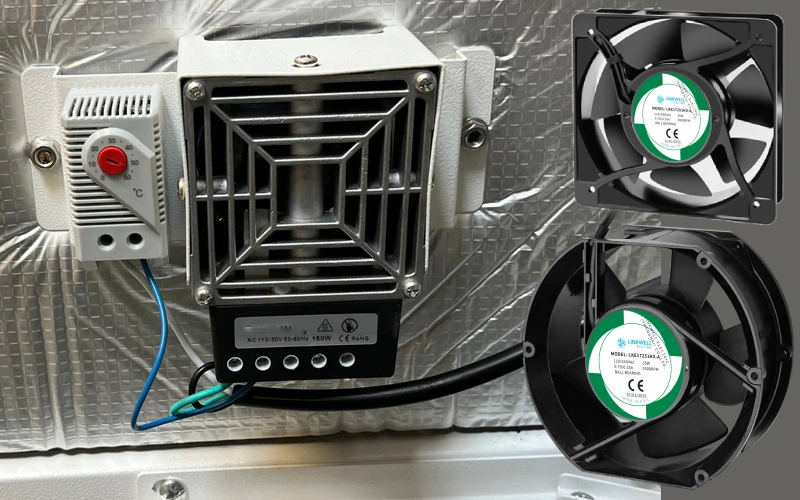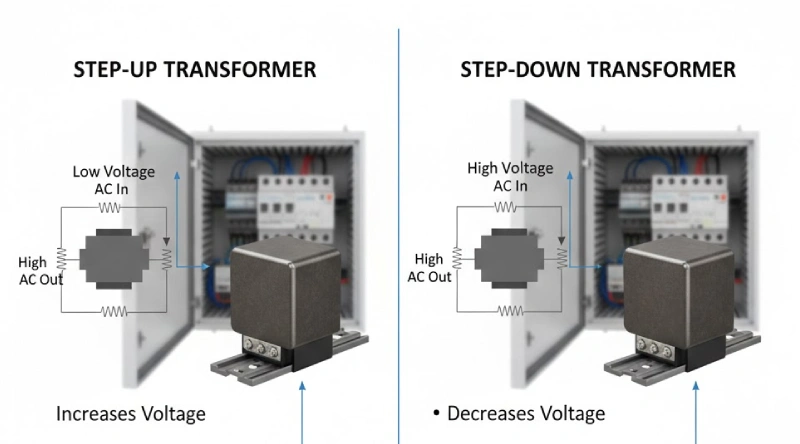A Thermostat With Hysteresis helps you keep electrical enclosures safe. You protect your equipment from overheating and moisture. When you use this kind of thermostat, you get stable temperature control. Here’s why it matters:
- Stable temperatures prevent sudden equipment failures.
- Less cycling means your cooling units last longer.
- You avoid condensation and ice, which can damage electronics.
- Overheating and low temperatures often cause failed circuits and corrosion.
Hysteresis makes sure your system only resets after reaching a safe state, so you check for faults before going back to normal operation.
Key Takeaways
- A Thermostat With Hysteresis stabilizes temperatures, preventing sudden equipment failures and extending the lifespan of cooling units.
- Using hysteresis reduces condensation and overheating, protecting sensitive electronics from damage and ensuring reliable operation.
- Fewer on/off cycles from hysteresis lead to less wear on equipment, saving you money on repairs and maintenance.
- Linkwell thermostats offer features like precise temperature control and durable materials, ensuring safety and efficiency in various environments.
- Choosing the right thermostat involves considering factors like active temperature control and proper sealing to maintain a stable internal environment.
What Is Hysteresis In Thermostats
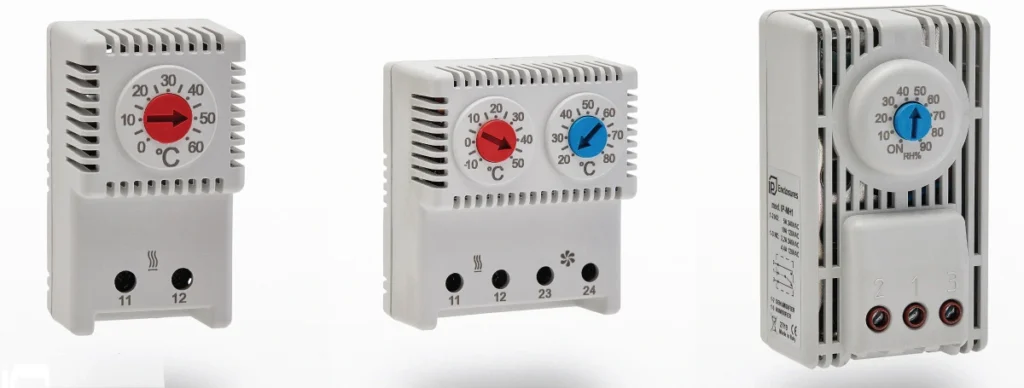
Hysteresis Explained Simply
You might wonder what hysteresis means when you hear about thermostats. Hysteresis is a smart feature that keeps your heating or cooling system from switching on and off too quickly. Instead of reacting to every tiny change in temperature, the thermostat remembers the recent temperature history. It sets two thresholds: one for turning the heater or cooler on and another for turning it off. For example, your thermostat might turn the heater on when the temperature drops below 18°C and switch it off when it rises above 22°C. This gap between the on and off points is called the hysteresis band.
Tip: Hysteresis helps you avoid constant cycling, which can wear out your equipment and waste energy.
A Thermostat With Hysteresis gives you more control over your environment. You get fewer sudden changes, and your system runs smoother. This means less noise, less stress on your devices, and a safer enclosure for your electrical components.
How It Works In Electrical Enclosures
When you use a Thermostat With Hysteresis inside an electrical enclosure, you protect your sensitive electronics from temperature swings. Here’s how hysteresis stands out compared to standard thermostat switching:
- Hysteresis introduces a temperature offset that prevents rapid switching, so your system stays stable.
- You reduce wear on fans, heaters, and other components, which helps them last longer.
- Standard thermostats may not use these offsets, so you might see more frequent switching and less stable temperature control.
If you install a thermostat with hysteresis, you keep your enclosure at a safe temperature range. You avoid overheating and condensation, which can cause corrosion or short circuits. Your equipment stays reliable, and you spend less time on repairs.
Thermostat With Hysteresis Safety Benefits
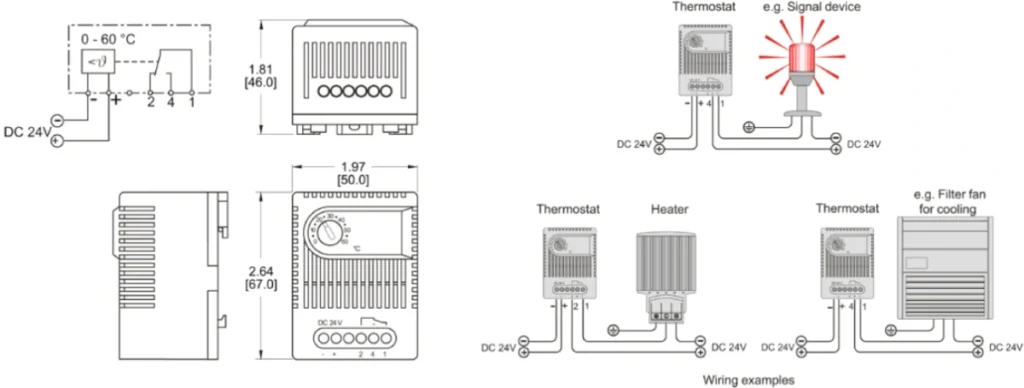
Preventing Overheating And Condensation
You want your electrical enclosures to stay dry and cool. Overheating and condensation are two of the biggest threats to your equipment. A Thermostat With Hysteresis helps you fight both problems by keeping the temperature steady and reducing sudden changes. Take a look at some common causes of overheating and condensation:
| Cause of Overheating and Condensation | Description |
|---|---|
| Temperature differential | The difference between the internal and external temperatures can lead to condensation, which may also indicate overheating due to inadequate heat dissipation. |
| Environmental Temperature Differential | High humidity and temperature differences in the environment can exacerbate both condensation and overheating issues. |
| Rapid temperature changes | Sudden shifts in temperature can cause condensation and may lead to overheating if the enclosure cannot adapt quickly. |
| Lack of Ventilation | Poor air circulation can trap heat and moisture, contributing to both overheating and condensation. |
| Equipment aging | Aging equipment may fail to maintain proper seals, allowing moisture in and increasing the risk of overheating. |
When you use a Thermostat With Hysteresis, you avoid rapid temperature swings. This means less chance for condensation to form inside your enclosure. You also prevent your equipment from getting too hot, which keeps your electronics safe and working longer.
Tip: Keeping your enclosure at a steady temperature helps stop corrosion and short circuits before they start.
Stable Temperature Control
You know how annoying it is when your heater or cooler keeps turning on and off. That’s called short cycling, and it can make your equipment wear out faster. A Thermostat With Hysteresis stops this by creating a buffer zone between the on and off points. Your system only switches when it really needs to, not every time the temperature changes a little.
Here’s what happens when you use thermostats with hysteresis:
- They help maintain comfort by preventing short cycling.
- Cycles per hour are designed to maximize efficiency in temperature control.
- Both methods aim to keep room temperature stable within a few degrees.
Stable temperature control does more than just protect your equipment. It also keeps your workspace safer. When you keep the temperature steady, you:
- Prevent overheating, which can lead to equipment failure and health risks for people nearby.
- Lower the risk of heat-related illnesses for workers near electrical equipment.
- Minimize the chances of fire hazards caused by overheating equipment.
You get peace of mind knowing your enclosure is safe and your equipment is running smoothly.
Reduced Equipment Wear
Every time your heater or fan turns on and off, it puts stress on the parts. Too many cycles can wear out switches, motors, and other components. A Thermostat With Hysteresis reduces the number of on/off cycles by waiting for a bigger change in temperature before switching. This means your equipment gets a break and lasts longer.
When you adjust the hysteresis, you see fewer on/off cycles. This not only makes your system more comfortable but also limits wear on your heating and cooling parts. Thermostats with a wider hysteresis band lead to less frequent cycling. Over time, this reduces wear and tear, saves you money on repairs, and keeps your system running efficiently.
Note: A thermostat with a hysteresis of 0.5°C or less can cause frequent cycling, but a wider hysteresis keeps your equipment from working too hard.
A Thermostat With Hysteresis gives you a simple way to protect your investment and keep your enclosure safe for years to come.
Linkwell Thermostats For Enclosure Protection
Product Features And Certifications
When you choose Linkwell thermostats, you get more than just temperature control. You get a product built for safety, reliability, and easy use. These thermostats come packed with features that make your job easier and your equipment safer. Take a look at what sets them apart:
| Feature | Description |
|---|---|
| Precise Temperature Control | Keeps your enclosure between 0°C and 60°C with simple dials. |
| Durable Material Technology | Uses tough plastic for long life and easy cleaning. |
| Color-Coded Interactive Design | Blue and red dials help you set temperatures quickly and avoid mistakes. |
| Broad Temperature Range | Works in more places than standard models, for both heating and cooling. |
| Compact Design | Fits into small spaces, perfect for tight control cabinets. |
| Certified Safety and Compliance | Meets UL and CE standards for global safety and quality. |
You also want to know your thermostat meets strict safety rules. Linkwell thermostats carry top certifications:
| Certification | Description |
|---|---|
| CE | Follows health, safety, and environmental rules for Europe. |
| RoHS | Limits harmful materials, keeping your workplace and the planet safer. |
| ISO 9001 | Proves Linkwell uses strong quality management for every product. |
Note: Global standards like CE and RoHS shape the design of Linkwell thermostats, making sure you get safe materials and smart safety features.
Application In Industrial Settings
You can use Linkwell thermostats in many industries. They protect your equipment and keep your operations running smoothly. Here’s how they help in real-world settings:
| Application | Benefit |
|---|---|
| Electrical enclosure heaters | Stops condensation and moisture damage in control cabinets. |
| Protect sensitive components | Keeps electronics working even when temperatures change fast. |
| Minimize downtime | Helps you avoid costly stops and keeps your equipment safe. |
You’ll see Linkwell thermostats in places like:
- Telecom
- Automation
- Power Control
- Traffic Signal Cabinets
These thermostats work well in harsh conditions. The IP65 rating keeps out dust and water. PTC heating technology means the thermostat adjusts itself, saving energy and boosting safety. When the right temperature is reached, it uses less power, so you save on electricity bills.
If you want a Thermostat With Hysteresis that stands up to tough jobs and meets global standards, Linkwell gives you peace of mind and long-lasting protection.
Choosing The Right Thermostat With Hysteresis
Key Selection Criteria
Picking the best Thermostat With Hysteresis for your electrical enclosure can feel tricky. You want to keep your equipment safe and your system running smoothly. Here are some practical tips to help you make the right choice:
- Active temperature control keeps your enclosure cool by removing heat quickly.
- Closed loop cooling stops outside air from getting in, which helps prevent moisture and dust.
- Correctly sized air conditioner matches the heat load, so you avoid overheating.
- Proper enclosure sealing blocks air leaks and keeps the inside environment stable.
- Digital temperature controller gives you precise control, making sure your settings stay accurate.
You should also look for features like adjustable cooling set points and heating options. If you can set the cooling point between 70 °F and 95 °F, you get more flexibility. A low hysteresis setting, such as 1 °F, helps keep temperature swings small. Integrated heaters protect your equipment during cold weather.
Tip: A thermostat with hysteresis creates a buffer against small temperature changes. This stability means less wear and tear, fewer system failures, and better reliability for your enclosure.
Linkwell Support And Customization
When you choose Linkwell, you get more than just a product. You get a partner who supports your project from start to finish. Linkwell offers tailored solutions and fast delivery, so you never have to worry about delays or mismatched equipment.
| Support Option | Description |
|---|---|
| Tailored Solutions | Custom thermostat heaters for unique enclosure sizes, voltage needs, and special challenges. |
| Flexible Options | Air heaters, ceramic, PTC, and fan-assisted models for different applications. |
| Dedicated After-Sales Support | Global service, technical help, and spare parts for reliable support. |
Linkwell’s OEM and ODM services let you customize your thermostat to fit your exact needs. You get direct factory pricing, strict quality control, and compliance testing to meet industry standards. Fast factory delivery keeps your project on schedule, and responsive technical support helps with installation and maintenance.
| Service Type | Benefits |
|---|---|
| OEM and ODM Services | Customization for industrial customers. |
| Fast Factory Delivery | Quick shipping to keep your operations moving. |
| Quality Control | High-quality enclosures that protect against harsh environments. |
| Compliance Testing | Products meet industry standards for reliability. |
| Technical Support | Help with installation and ongoing maintenance. |
| Direct Factory Pricing | Transparent costs for easy budgeting. |
| After-Sales Support | Full support after purchase for peace of mind. |
If you want a Thermostat With Hysteresis that fits your application and keeps your equipment safe, Linkwell makes it easy. You get expert advice, fast delivery, and solutions built for your needs.
You want your electrical enclosures to stay safe and reliable. A Thermostat With Hysteresis helps you prevent overheating, condensation, and equipment wear. Linkwell thermostats give you long-term protection and keep your systems running smoothly. Take a look at how they make a difference:
| Feature | Benefit |
|---|---|
| Heaters keep temperatures above dew point | Stop moisture damage and extend component life |
| Protect equipment from freezing | Avoid downtime in cold climates |
| Stabilize internal environment | Reduce thermal stress and improve reliability |
| Minimize humidity and temperature swings | Lower risks of short circuits and fires |
You can trust Linkwell for enclosure safety. If you want expert help, just follow these steps:
- Visit the Linkwell website for enclosure solutions.
- Reach out to Linkwell to discuss your safety needs.
- Ask about custom options for your electrical installations.
You get support from a team with years of experience. Linkwell helps you protect your equipment and keep your operations safe.
FAQ
What does hysteresis mean for my thermostat?
Hysteresis means your thermostat waits for a bigger temperature change before switching on or off. You get fewer cycles, less wear, and more stable temperatures inside your enclosure.
Can I use Linkwell thermostats in outdoor cabinets?
Yes, you can. Linkwell thermostats work well in outdoor cabinets. They handle tough weather and keep your equipment safe from moisture and temperature swings.
How do I know which thermostat is right for my enclosure?
You should check your enclosure size, temperature range, and equipment needs. If you need help, Linkwell offers expert advice and customization options.
Do Linkwell thermostats need regular maintenance?
You don’t need much maintenance. Just check for dust and make sure the thermostat stays clean. This helps your system run smoothly and last longer.

